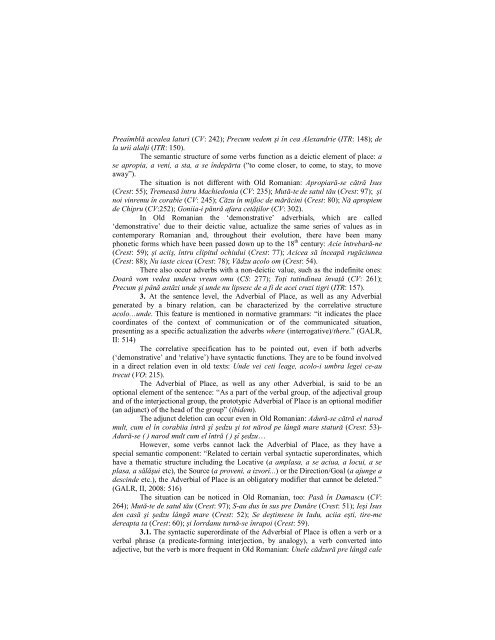language and literature european landmarks of identity
language and literature european landmarks of identity
language and literature european landmarks of identity
Create successful ePaper yourself
Turn your PDF publications into a flip-book with our unique Google optimized e-Paper software.
Preaîmblă acealea laturi (CV: 242); Precum vedem şi în cea Alex<strong>and</strong>rie (ITR: 148); de<br />
la urii alalţi (ITR: 150).<br />
The semantic structure <strong>of</strong> some verbs function as a deictic element <strong>of</strong> place: a<br />
se apropia, a veni, a sta, a se îndepărta (“to come closer, to come, to stay, to move<br />
away”).<br />
The situation is not different with Old Romanian: Apropiară-se cătră Isus<br />
(Crest: 55); Tremeasă întru Machiedonia (CV: 235); Mută-te de satul tău (Crest: 97); şi<br />
noi vinremu în corabie (CV: 245); Căzu în mijloc de mărăcini (Crest: 80); Nă apropiem<br />
de Chipru (CV:252); Goniia-i pănră afara cetăţilor (CV: 302).<br />
In Old Romanian the ‘demonstrative’ adverbials, which are called<br />
‘demonstrative’ due to their deictic value, actualize the same series <strong>of</strong> values as in<br />
contemporary Romanian <strong>and</strong>, throughout their evolution, there have been many<br />
phonetic forms which have been passed down up to the 18 th century: Acie întrebară-ne<br />
(Crest: 59); şi aciiş, întru clipitul ochiului (Crest: 77); Acicea să înceapă rugăciunea<br />
(Crest: 88); Nu iaste cicea (Crest: 78); Vădzu acolo om (Crest: 54).<br />
There also occur adverbs with a non-deictic value, such as the indefinite ones:<br />
Doară vom vedea undeva vreun omu (CS: 277); Toţi tutindinea învaţă (CV: 261);<br />
Precum şi până astăzi unde şi unde nu lipsesc de a fi de acei cruzi tigri (ITR: 157).<br />
3. At the sentence level, the Adverbial <strong>of</strong> Place, as well as any Adverbial<br />
generated by a binary relation, can be characterized by the correlative structure<br />
acolo…unde. This feature is mentioned in normative grammars: “it indicates the place<br />
coordinates <strong>of</strong> the context <strong>of</strong> communication or <strong>of</strong> the communicated situation,<br />
presenting as a specific actualization the adverbs where (interrogative)/there.” (GALR,<br />
II: 514)<br />
The correlative specification has to be pointed out, even if both adverbs<br />
(‘demonstrative’ <strong>and</strong> ‘relative’) have syntactic functions. They are to be found involved<br />
in a direct relation even in old texts: Unde vei ceti leage, acolo-i umbra legei ce-au<br />
trecut (VO: 215).<br />
The Adverbial <strong>of</strong> Place, as well as any other Adverbial, is said to be an<br />
optional element <strong>of</strong> the sentence: “As a part <strong>of</strong> the verbal group, <strong>of</strong> the adjectival group<br />
<strong>and</strong> <strong>of</strong> the interjectional group, the prototypic Adverbial <strong>of</strong> Place is an optional modifier<br />
(an adjunct) <strong>of</strong> the head <strong>of</strong> the group” (ibidem).<br />
The adjunct deletion can occur even in Old Romanian: Adură-se cătră el narod<br />
mult, cum el în corabiia întră şî şedzu şi tot nărod pe lângă mare statură (Crest: 53)-<br />
Adură-se ( ) narod mult cum el întră ( ) şî şedzu…<br />
However, some verbs cannot lack the Adverbial <strong>of</strong> Place, as they have a<br />
special semantic component: “Related to certain verbal syntactic superordinates, which<br />
have a thematic structure including the Locative (a amplasa, a se aciua, a locui, a se<br />
plasa, a sălăşui etc), the Source (a proveni, a izvorî...) or the Direction/Goal (a ajunge a<br />
descinde etc.), the Adverbial <strong>of</strong> Place is an obligatory modifier that cannot be deleted.”<br />
(GALR, II, 2008: 516)<br />
The situation can be noticed in Old Romanian, too: Pasă în Damascu (CV:<br />
264); Mută-te de satul tău (Crest: 97); S-au dus în sus pre Dunăre (Crest: 51); Ieşi Isus<br />
den casă şi şedzu lângă mare (Crest: 52); Se deştinsese în Iadu, aciia eşti, tire-me<br />
dereapta ta (Crest: 60); şi Iorrdanu turnă-se înrapoi (Crest: 59).<br />
3.1. The syntactic superordinate <strong>of</strong> the Adverbial <strong>of</strong> Place is <strong>of</strong>ten a verb or a<br />
verbal phrase (a predicate-forming interjection, by analogy), a verb converted into<br />
adjective, but the verb is more frequent in Old Romanian: Unele cădzură pre lângă cale


